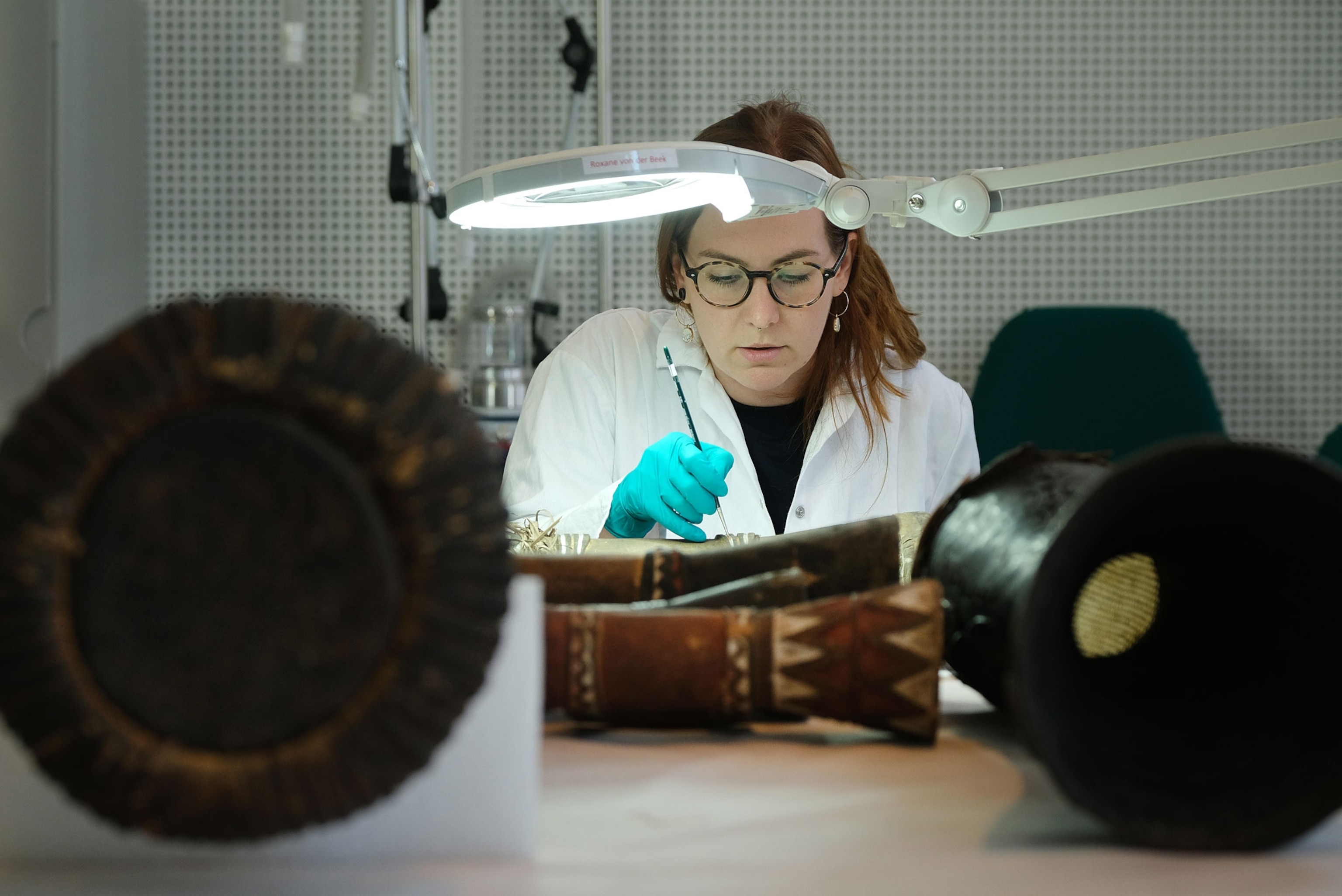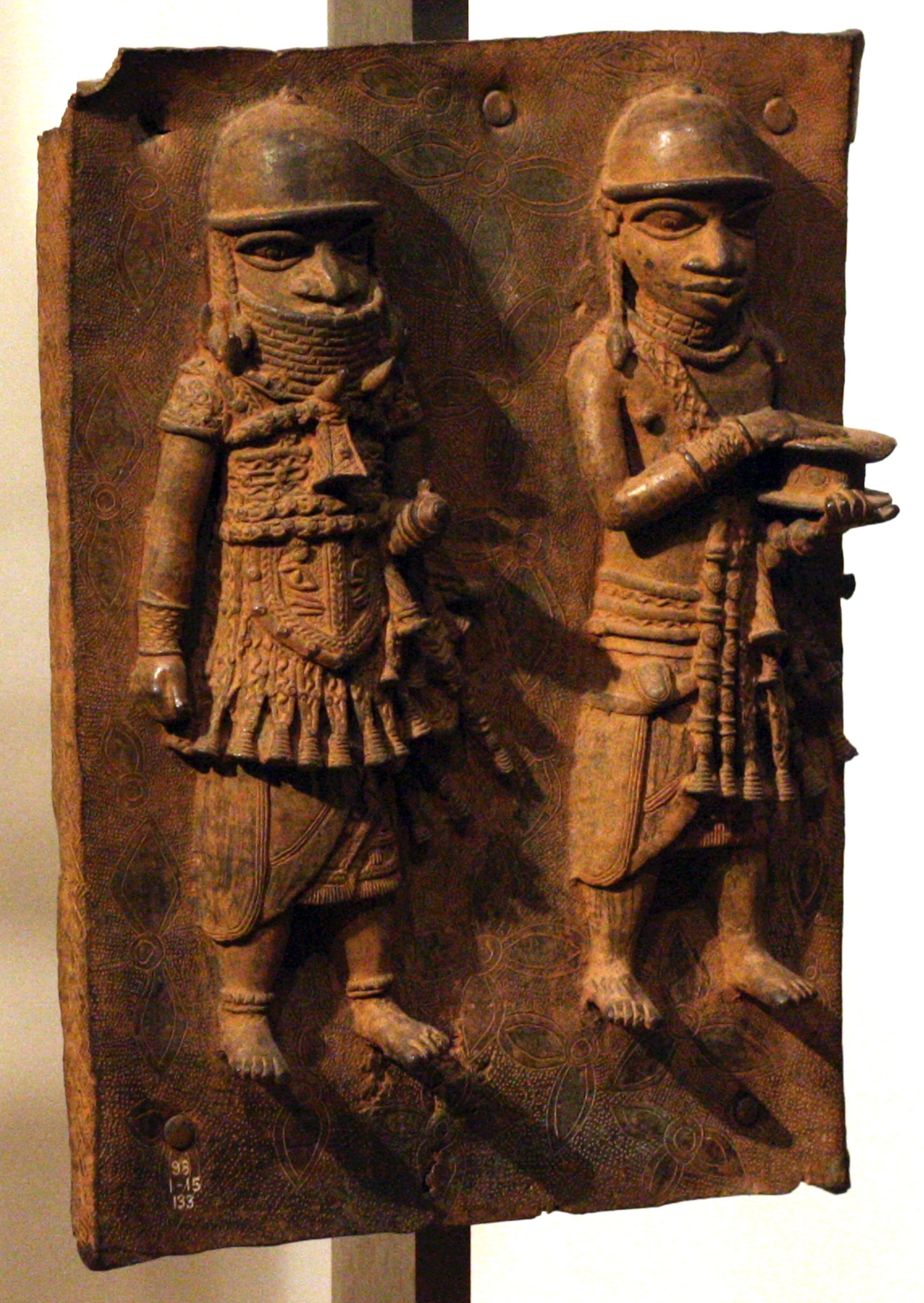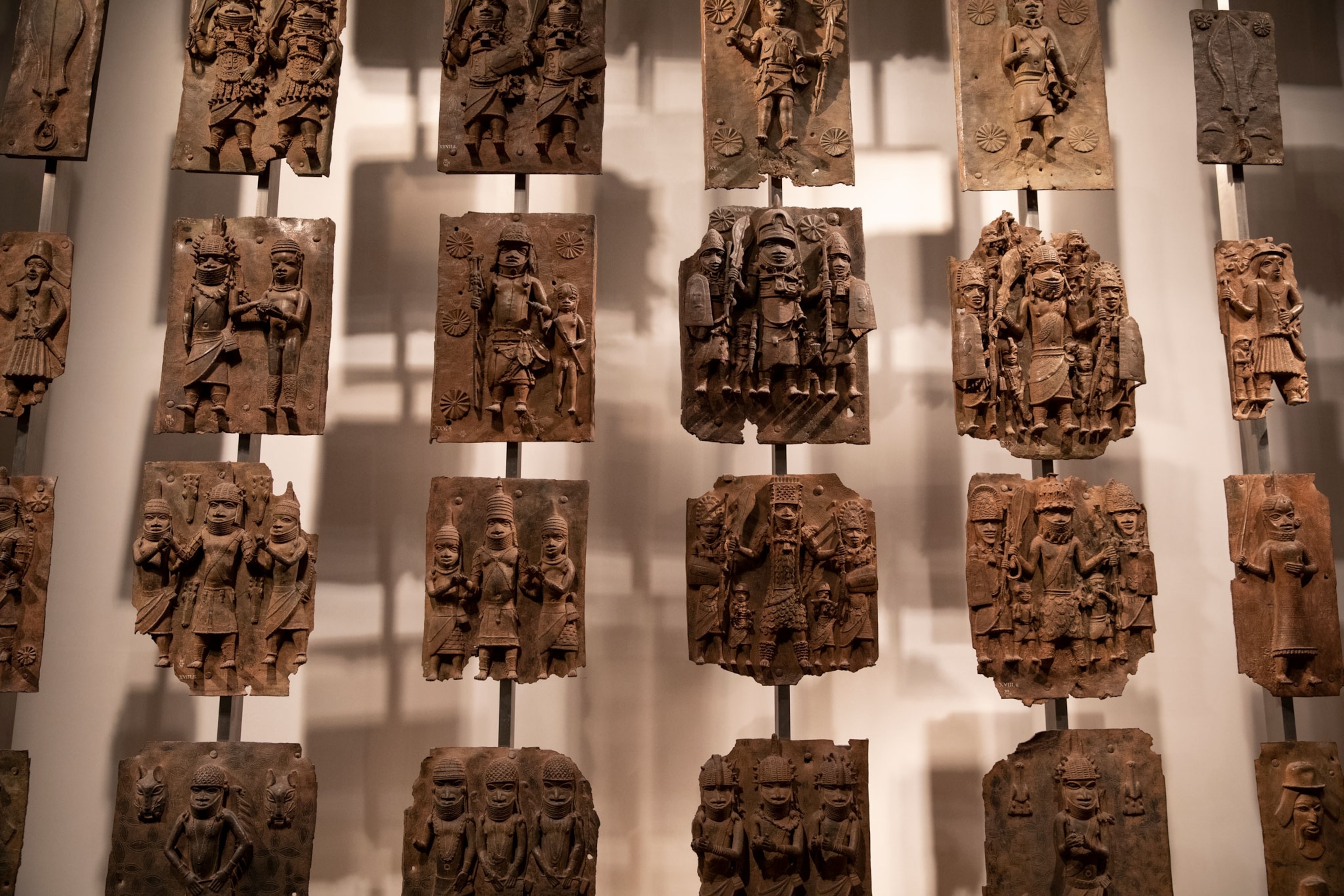
In Germany, a new museum stirs up a colonial controversy
Berlin's Humboldt Forum is reigniting debate over who has the right to own and display Africa's heritage.
For years, the head of a queen sat in storage in a building in Berlin. Her face is smooth, but her head is intricately engraved and topped with a crown befitting a lyoba—a matriarch figure from the Kingdom of Benin, in present day Nigeria.
Carved in the early 16th century, it is one of more than a thousand metal sculptures looted by British soldiers as they plundered Benin City in 1897. In the century since, the so-called Benin Bronzes have been bought and sold by museums and private collectors across Europe and North America, and today they are among the most coveted African artifacts in the world.

All of which poses a major problem for Europe’s newest museum. Twenty years in the making, Germany’s Humboldt Forum opens its doors digitally this week—and intends to open physically next spring—to display thousands of artifacts from Africa, Asia, and beyond. Berlin’s Ethnological Museum, from whose collection the Forum will heavily draw, currently controls some 530 Bronzes and other Benin artifacts—the second largest such collection in the world, after the British Museum. Half of the Benin collection will go on display in the Forum.
Late last week, just days before the Forum’s inauguration, Nigeria’s ambassador to Germany wrote a letter to German Chancellor Angela Merkel demanding Germany send its Benin Bronzes back, reigniting a controversy over who should have the right to own, curate, and display African heritage to the world.
Across Europe, activists are demanding the return of hundreds of thousands of African artifacts that were stolen or purchased during colonial times. “When we talk about restitution, we don’t mean emptying European or American museums of their collections,” says George Abungu, former Director General of the National Museums of Kenya and an advisor to the Humboldt Forum. “The question of restitution is not about returning everything, but [rather] things that have meaning—symbolic significance, ritual meanings—that were taken away. These need to come back home.”
In 2017, President Emmanuel Macron of France, a nation that colonized large swaths of North and West Africa, declared that France would return the artifacts it stole. In 2018 Belgium, which colonized Congo, was rattled by protests calling for authorities to return some of the 180,000 African artifacts kept in the Royal Museum for Central Africa outside Brussels. The British Museum in London, which owns 69,000 artifacts from sub-Saharan Africa, has notoriously refused to give back or even loan out its improperly acquired African artifacts. (A new museum in Benin City, Nigeria, hopes to change that.)
Germany—having colonized Africa more briefly than other European powers—had so far weathered this storm relatively unnoticed. That is changing as the Humboldt Forum brings the country front and center in the restitution debate.
The Forum is located just a few streets from where, 136 years ago, Europe’s leaders convened in the personal residence of King Wilhelm I to carve Africa into pieces for the colonizers. The 1884-1885 Berlin Conference, also known as the Congo Conference, was a bid by Wilhelm and Chancellor Otto von Bismarck to catch up with other colonial leaders in their race to profit from Africa’s natural resources, slaves, and craftsmanship.
That controversial history is particularly difficult to overlook on account of the building that Germany’s Bundestag chose to house the Forum: the Berlin Palace, the former Prussian palace where Wilhelm’s successor, Wilhelm II, lived off Africa’s riches.
The Humboldt Forum’s long-awaited and oft-delayed inauguration comes at the peak of a global pandemic. But a delay to its physical opening may be the least of its worries. Its creators are facing a vociferous debate over whether a European museum of African artifacts should even exist.
“We as Africans are asking—what do they want to show us by rebuilding this palace of the colonialists? Do they want to show us they are still the ones in power?” says Mnyaka Sururu Mboro, a Tanzanian living in Germany who opposed the Forum’s construction. “I have been in the basements in the Ethnological Museum here in Berlin. You find there are thousands and thousands of objects in there that were taken during colonial times. We Africans—we want them back.”
Breaking ground
First conceived in 2001, the Humboldt Forum is located in the heart of Berlin, next to the city’s other powerhouse institutions on Museum Island, the tourist mecca in the center of the Spree River. Its founders wanted Berlin to become one of the great museum cities of Europe, boasting a world-class institution comparable to the British Museum or the Louvre.
The Forum is named in honor of a pair of 18th century brothers who Germans remember with pride: the philosopher Wilhelm von Humboldt, and his younger sibling, Alexander von Humboldt, a naturalist who collected specimens and artifacts from across the globe.
According to the museum’s website, “the Humboldt Forum is concerned with nothing less than the history and culture of the world in all its complexity.” It strives “to tell the universal story of the human race from multiple perspectives.”
The Forum will exhibit works from Berlin’s Asian Art Museum, Humboldt University, the Berlin City Museum, and the Ethnological Museum. Many of its artifacts came to Berlin through a “network of traders, collectors, colonial officers and civil servants,” the museum’s website states.
According to Paola Ivanov, who is curating part of the Humboldt Forum’s Africa collection, before the Berlin Conference propelled Germany into the race to conquer Africa, the Ethnological Museum possessed just 3,361 African objects. By the end of the colonial era, that number had soared to some 50,000. Some of those objects were plundered from what was then known as German East Africa during the German colonial period of 1886-1919.

Germany’s African territories included parts of present-day Tanzania, Rwanda, and Burundi in East Africa; Namibia in the south; and Cameroon and Togo in the west. In 2016, the Ethnological Museum established a framework “to research the provenance of problematic holdings,” specifically the more than 10,000 artifacts from Tanzania, some of which were obtained through “violent appropriation and colonial wars.” The museum also invited scientists from Tanzania to research artifacts in the collection, fostering a cross-continental exchange.
“We have very problematic objects in the Tanzania collection, because Germans conquered Tanzania in a very violent way,” Ivanov says. “The Maji Maji wars that Germans conducted in southern Tanzania caused the deaths of at least 200,000 people. A lot of objects are connected with these violent conquests.”
Ivanov says the museum has been conducting provenance research to understand how hundreds of these items came into German hands. For instance, her team of anthropologists traced a set of sculpted figures from Cameroon and a stool from Benin back to their origins. For the Humboldt Forum’s inaugural display, they surrounded these artifacts with historical files, photos, films, and other media selected with the help of African curators.
But to do the same for all of the museum’s 75,000 African artifacts would be a Herculean task. “Without this research, no Humboldt Forum or ethnological museum can be opened today,” said art historian Bénédicte Savoy, who served on the Humboldt Forum’s advisory board. She resigned in 2017 over what she said was the museum’s failure to critically investigate its collection. Each item in the collection ought to be thoroughly vetted before being put on display, Savoy says, so that the public knows “how much blood is dripping from a work of art.” (This forensic archaeologist has identified hundreds of stolen artifacts.)
Bronze beauties
Of all the African artifacts in European museums, none have garnered more attention than the Benin Bronzes—which, incidentally, are made of brass as well as bronze.
“They’ve become kind of the symbol for the whole restitution debate,” says Jörg Häntzschel, who writes about museums for the German newspaper Sueddeutsche Zeitung. “They’re like the scars of all the objects in European museums, partly because they’re really valuable.” Some have sold at global art auctions for millions of dollars.
“These Benin objects are stunningly beautiful,” says Häntzschel, who has traveled to Cameroon to see African artifacts in their original homes. “And they’re also such a clear-cut case of looting—they were all looted within a few days by this British expedition.” Many were quickly sold off to wealthy collectors in Germany and Austria.

“The Germans knew very well that the objects they were buying were illegally transferred from Benin City to London,” writes Kwame Opoku, a journalist and author who advocates for the return of Africa’s artifactual heritage. Some of the bronzes were auctioned just months after their seizure. “Many of the objects the Germans and Austrians bought must have had some of the blood of the people of Benin on them, fresh from the battlefield,” Opoku writes. (Here's how the British took the Parthenon's marbles.)
Today, even nations that never held colonies in Africa are being pulled into the restitution debate. Descendants of Benin rulers have written letters to the Art Institute of Chicago and Chicago’s Field Museum requesting that their ancestors’ artifacts be returned. The Museum of Fine Arts in Boston, the Rhode Island School of Design Museum, and the Metropolitan Museum of Art in New York all own bronzes from Benin. “Those Benin Bronzes are scattered everywhere in the world,” says Abungu. “The moral obligation is on the people who took these things. You can’t run away from it.”
Some believe Germany has a unique responsibility to return its bronzes. After all, it was the Berlin Conference that accelerated the “scramble for Africa” and led to the looting of the bronzes and many other artifacts. Others say the Forum is an inherently racist institution and ought never to have been built. To display colonial treasure in a former imperialist palace harkens back to “times when ‘exotic curiosities’ were displayed in the ‘cabinets of wonders,’” according to No Humboldt 21, a group of activists who oppose the Forum.
Simon Rittmeier, co-founder of the International Inventories Programme, which seeks to catalogue Kenya’s artifacts abroad, explains that “the Ethnological Museum that we know started in the 1600s with this curiosity complex.” During the German empire, says Rittmeier, “the power for a king was in showing exotic objects and assembling them in one place as a sign of power. This European idea lingers. It’s still present today.”
A 'universal museum'
A former director of the British Museum, Neil MacGregor, coined the concept of the “universal museum” as a place where people from all cultures could come to admire and learn from the past. The Humboldt Forum was fashioned with that same vision, and MacGregor was hired to lead it, becoming one of its three founding directors. The Forum’s initial mission was “to be in touch with as much of the world as possible” and create a “Universal Museum for the 21st Century.”
But to those who oppose the Forum, that idea seems increasingly at odds with the reality, underscored by the tightening of Europe’s borders, that most Africans will never have the chance to experience Europe’s newest institution.
“If Africans are not let into European borders—some even die on their way—you can’t talk about a ‘universal museum,’” says Leonie Emeka, a Nigerian German and recent art history graduate who has conducted provenance research into the Humboldt Forum’s collection. Some African artists have even been denied visas to exhibit their own work in European countries, including Germany. “Not everyone in this world has access to this universal museum,” Emeka says.
According to Savoy, the new museum comes at the wrong time. “Germany is redefining itself as an international, open country,” she says. “It is making huge efforts to accept people from conflict and war zones. So to make a [colonial] museum in this place at this moment—they cannot.”
The first step toward restitution of African artifacts, says Savoy, is for European museums to catalog the objects they have. Germany’s Ethnology Museum owns some half a million artifacts, but the origins of many remain unknown. Last year, the philanthropist George Soros launched a $15-million initiative to support provenance research aimed at restituting African artwork.
Some activists have taken matters into their own hands. Mwazulu Diyabanza, who advocates for Europe to pay reparations to Africa for colonialism, has gone so far as to steal artifacts back from French museums, arguing that to steal something that was stolen is merely to return it to its rightful place. The act of stealing back African artifacts was popularized in a scene in Marvel’s hit 2018 superhero movie set in Africa, Blank Panther.
Museum curators counter that artifacts shouldn’t be returned to Africa until there are modern, climate-controlled museums and storage facilities there in which to house them. But last year, Häntzschel discovered that Berlin’s Ethnological Museum had been storing some of its own artifacts under terrible conditions. Its Berlin storage rooms would sometimes flood, leaving artifacts ankle-deep in water. He found similar substandard conditions in museums across Germany. One museum curator told Häntzschel that as many as 15 percent of all the artifacts in Germany have not even been counted. “There is total chaos in German ethnological museums,” she said.
Last year, a hundred academics signed an open letter demanding that Germany immediately open its African collections to researchers to examine whether they were appropriately obtained. Their call came the year after Germany’s culture minister outlined how German museums should research the provenance of their artifacts from abroad.
As for the Benin Bronzes, the Forum will devote two large rooms to the Benin exhibit that describe the 1,000-year history of the Kingdom of Benin, as well as the 1897 looting by British soldiers. And in 2018 Germany’s Ethnological Museum joined a handful of other European museums in announcing they would loan back some of the bronzes for the inauguration of a new museum in Nigeria. But others argue such objects should be returned outright.
To Häntzschel, the restitution debate is “not just a question of ownership. It’s a question of how do you deal with your past? It’s a question of what do you do with it?”
By putting African objects into showcases and declaring them art, says Rittmeier, we are “disconnecting them from their former use, disconnecting them from being touched, from being felt.” This “cuts the ties with its history.”
Rather than simply displaying African objects for museumgoers to gaze at, some have suggested rethinking the museum experience altogether. Instead of walking through exhibits, visitors might attend gallery tours and lectures about a particular collection led by curators who have made it their life’s work to understand their historical significance.
“I would do a completely different anthropological museum,” says Emeka, the young art history graduate. A museum, she says, should not be a static building, but a living thing. The 644 million euros spent on the Humboldt Forum, she suggests, might have been better spent flying anthropologists from Angola to Germany to curate presentations about Angolan artifacts, or traveling across Angola to reach out to communities who don’t have access to a “universal museum” in a country they cannot reach.